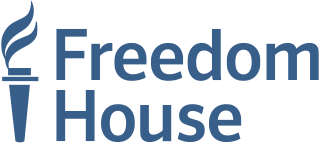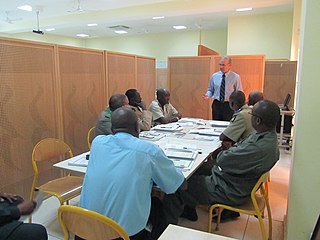
Freedom House is a non-profit organization based in Washington, D.C. It is best known for political advocacy surrounding issues of democracy, political freedom, and human rights. Freedom House was founded in October 1941, with Wendell Willkie and Eleanor Roosevelt serving as its first honorary chairpersons. Most of the organization's funding comes from the U.S. State Department and other government grants. It also receives funds from various semi-public and private foundations, as well as individual contributions.
In politics, a regime is the form of government or the set of rules, cultural or social norms, etc., that regulate the operation of a government or institution and its interactions with society. The two broad categories of regimes that appear in most literature are democratic and autocratic. However, autocratic regimes can be broken down into a subset of many different types. The key similarity between all regimes are the presence of rulers, and either formal or informal institutions.

Democratization, or democratisation, is the democratic transition to a more democratic political regime, including substantive political changes moving in a democratic direction.
College and university rankings order institutions in higher education based on factors that vary depending on the ranking. Some rankings evaluate institutions within a single country, while others assess institutions worldwide. Rankings are typically conducted by magazines, newspapers, websites, governments, or academics. In addition to ranking entire institutions, specific programs, departments, and schools can be ranked. Some rankings consider measures of wealth, excellence in research, selective admissions, and alumni success. Rankings may also consider various combinations of measures of specialization expertise, student options, award numbers, internationalization, graduate employment, industrial linkage, historical reputation and other criteria.

Comparative politics is a field in political science characterized either by the use of the comparative method or other empirical methods to explore politics both within and between countries. Substantively, this can include questions relating to political institutions, political behavior, conflict, and the causes and consequences of economic development. When applied to specific fields of study, comparative politics may be referred to by other names, such as comparative government.
The International Forestry Resources and Institutions (IFRI) Network is a collective of research partners at 12 universities or non-governmental organizations in 11 countries around the world that focus on how institutions and governance arrangements shape forest use and management outcomes. Scholars and policy makers affiliated with IFRI are interested in understanding the role of formal and informal institutions in enhancing livelihoods and adaptive capacity of peoples, conserving biodiversity, and promoting greater sustainability in carbon sequestration. IFRI's goal is to carry out rigorous research that can help policy makers and forest users design and implement improved evidence-based forest policies. IFRI comprises partner collaborating research institutes in North America, Latin America, Asia and Africa. IFRI utilizes the Institutional Analysis and Development (IAD) framework, created at the Workshop in Political Theory and Policy Analysis at Indiana University by Elinor Ostrom and her colleagues.

Freedom in the World is a yearly survey and report by the U.S.-based non-governmental organization Freedom House that measures the degree of civil liberties and political rights in every nation and significant related and disputed territories around the world.

The Répertoire International des Sources Musicales is an international non-profit organization, founded in Paris in 1952, with the aim of comprehensively documenting extant historical sources of music all over the world. It is the largest organization of its kind and the only entity operating globally to document written musical sources. RISM is one of the four bibliographic projects sponsored by the International Musicological Society and the International Association of Music Libraries, Archives and Documentation Centres, the others being Répertoire International de Littérature Musicale, Répertoire international d'iconographie musicale, and Répertoire international de la presse musicale.

Democracy promotion, also referred to as democracy building, can be domestic policy to increase the quality of already existing democracy or a strand of foreign policy adopted by governments and international organizations that seek to support the spread of democracy as a system of government. Among the reasons for supporting democracy include the belief that countries with a democratic system of governance are less likely to go to war, are likely to be economically better off and socially more harmonious. In democracy building, the process includes the building and strengthening of democracy, in particular the consolidation of democratic institutions, including courts of law, police forces, and constitutions. Some critics have argued that the United States has used democracy promotion to justify military intervention abroad.
Gerardo L. Munck is a political scientist specializing in comparative politics. He is professor of political science and international relations at the University of Southern California.
The Political Database of the Americas (PDBA) is a non-governmental organization based at the Center for Latin American Studies (CLAS), an academic center of the Edmund A. Walsh School of Foreign Service of Georgetown University, Washington, D.C. It was formed in collaboration with the Organization of American States (OAS) and FLACSO-Chile. The PDBA was succeeded by the States and Institutions of Governance in Latin America (SIGLA) database, the beta version of which launched in 2022.

The Ibrahim Index of African Governance (IIAG), established in 2007, provides an assessment of the quality of governance in African countries. The IIAG is compiled by 81 indicators and 265 variables from 54 data projects, coming from 47 independent African and international data sources. Published every two years, the IIAG is one of the world’s most comprehensive collections of data on African governance.
Constitutional references to God exist in the constitutions of a number of nations, most often in the preamble. A reference to God in a legal text is called invocatio dei if the text itself is proclaimed in the name of the deity. A reference to God in another context is called nominatio dei. Such invocationes and nominationes dei are found notably in several European constitutional traditions and in the constitutions of Islamic countries.

General elections were held in Honduras on 27 November 1993. Voters cast a single ballot for both the presidential and Congressional election.
A hybrid regime is a type of political system often created as a result of an incomplete democratic transition from an authoritarian regime to a democratic one. Hybrid regimes are categorized as having a combination of autocratic features with democratic ones and can simultaneously hold political repressions and regular elections. Hybrid regimes are commonly found in developing countries with abundant natural resources such as petro-states. Although these regimes experience civil unrest, they may be relatively stable and tenacious for decades at a time. There has been a rise in hybrid regimes since the end of the Cold War.
The Center for Latin American Studies is an academic institute within the School of Foreign Service of Georgetown University in Washington, DC dedicated to education about and research of Latin America. The Center was founded in 1959 by Dr. William Manger, the former Assistant Secretary General of the Organization of American States, as the Georgetown University Latin American Studies Program. Due to its inter-disciplinary orientation, it was one of the first programs of its kind in the United States.

The Comparative Study of Electoral Systems (CSES) is a collaborative research project among national election studies around the world. Participating countries and polities include a common module of survey questions in their national post-election studies. The resulting data are collated together along with voting, demographic, district and macro variables into one dataset allowing comparative analysis of voting behavior from a multilevel perspective.

Democratic backsliding is a process of regime change towards autocracy that makes the exercise of political power by the public more arbitrary and repressive. This process typically restricts the space for public contestation and political participation in the process of government selection. Democratic decline involves the weakening of democratic institutions, such as the peaceful transition of power or free and fair elections, or the violation of individual rights that underpin democracies, especially freedom of expression. Democratic backsliding is the opposite of democratization.
Betilde Muñoz-Pogossian is a Venezuelan political scientist and international affairs official. She has worked as a director and election observer at the Organization of American States (OAS), including as Director of the Department for Electoral Cooperation and Observation from 2011 to 2014 and then as Director of the Department of Social Inclusion.

The Bertelsmann Transformation Index (BTI) is a measure of the development status and governance of political and economic transformation processes in developing and transition countries around the world. The BTI has been published biennially by the Bertelsmann Stiftung since 2005, most recently in 2022 on 137 countries. The index measures and compares the quality of government action in a ranking list based on self-recorded data and analyzes successes and setbacks on the path to constitutional democracy and a market economy accompanied by sociopolitical support. For this purpose, the "Status Index" is calculated on the general level of development with regard to democratic and market-economy characteristics and the "Management Index" on the political management of decision-makers.










